| Listing 1 - 10 of 41 | << page >> |
Sort by
|
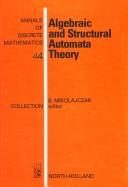
ISBN: 0444874585 9780444874580 9780080867847 0080867847 1281790702 9781281790705 9786611790707 6611790705 Year: 1991 Volume: 44 Publisher: Amsterdam: North-Holland,
Abstract | Keywords | Export | Availability | Bookmark
 Loading...
Loading...Choose an application
- Reference Manager
- EndNote
- RefWorks (Direct export to RefWorks)
Automata Theory is part of computability theory which covers problems in computer systems, software, activity of nervous systems (neural networks), and processes of live organisms development.The result of over ten years of research, this book presents work in the following areas of Automata Theory: automata morphisms, time-varying automata, automata realizations and relationships between automata and semigroups.Aimed at those working in discrete mathematics and computer science, parts of the book are suitable for use in graduate courses in computer science, electronics, teleco
Discrete mathematics --- Sequential machine theory. --- Algebra. --- Sequential machine theory --- Mathematics --- Mathematical analysis --- Finite automata --- Finite state machines (Machine theory) --- Machine theory --- Electronic digital computers
Book
ISBN: 0262130769 9780262130769 Year: 1971 Volume: 65 Publisher: Cambridge (Mass.): MIT Press,
Abstract | Keywords | Export | Availability | Bookmark
 Loading...
Loading...Choose an application
- Reference Manager
- EndNote
- RefWorks (Direct export to RefWorks)
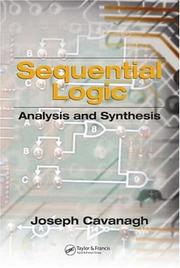
ISBN: 0849375649 9780849375644 1315221721 9781315221724 9781315221724 9781351828925 Year: 2007 Publisher: Boca Raton: CRC,
Abstract | Keywords | Export | Availability | Bookmark
 Loading...
Loading...Choose an application
- Reference Manager
- EndNote
- RefWorks (Direct export to RefWorks)
Emphasizing structured and rigorous design principles that can be applied to practical applications, Sequential Logic offers a thorough exposition of the analysis and synthesis of both synchronous and asynchronous sequential machines. This book reviews the analysis of combinatorial logic, defines sequential machines, and discusses methods for synthesizing synchronous sequential machines. It also covers the analysis and synthesis of asynchronous sequential machines and pulse-mode asynchronous sequential machines. The author presents basic and advanced concepts in sequential machine analysis and synthesis for practicing electrical and computer engineers, undergraduate, and graduate students.
Sequential machine theory --- Sequential machine theory. --- combinatietheorie --- sequentiele logica --- synchrone machine --- sequentiele machine --- asynchrone machine --- Finite automata --- Finite state machines (Machine theory) --- Machine theory --- Electronic digital computers
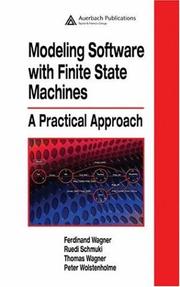
ISBN: 0849380863 9780849380860 9780429121371 9781466526532 Year: 2006 Publisher: Boca Raton, FL Auerbach
Abstract | Keywords | Export | Availability | Bookmark
 Loading...
Loading...Choose an application
- Reference Manager
- EndNote
- RefWorks (Direct export to RefWorks)
Modeling Software with Finite State Machines: A Practical Approach explains how to apply finite state machines to software development. It provides a critical analysis of using finite state machines as a foundation for executable specifications to reduce software development effort and improve quality. It discusses the design of a state machine and of a system of state machines. It also presents a detailed analysis of development issues relating to behavior modeling with design examples and design rules for using finite state machines. This text demonstrates the implementation of these concepts using StateWORKS software and introduces the basic components of this software.
software machinebouw --- fsm --- embedded system --- programmeren --- Computer software --- Machine theory. --- Development. --- Sequential machine theory --- Finite automata --- Finite state machines (Machine theory) --- Machine theory --- Electronic digital computers --- Development of computer software --- Software development --- Development
Book
ISBN: 3110039028 311083202X Year: 1972 Publisher: Berlin de Gruyter
Abstract | Keywords | Export | Availability | Bookmark
 Loading...
Loading...Choose an application
- Reference Manager
- EndNote
- RefWorks (Direct export to RefWorks)
Categories (Mathematics) --- Sequential machine theory --- Finite automata --- Finite state machines (Machine theory) --- Machine theory --- Electronic digital computers --- Category theory (Mathematics) --- Algebra, Homological --- Algebra, Universal --- Group theory --- Logic, Symbolic and mathematical --- Topology --- Functor theory --- Sequential machine theory. --- Categories (Mathematics).
Book
ISBN: 9780521857482 0521857481 9780511816239 9780511656385 0511656386 0511816235 1107210003 9781107210004 1139931318 9781139931311 0511658249 9780511658242 0511655533 9780511655531 0511656939 9780511656934 Year: 2010 Publisher: Cambridge ; New York : Cambridge University Press,
Abstract | Keywords | Export | Availability | Bookmark
 Loading...
Loading...Choose an application
- Reference Manager
- EndNote
- RefWorks (Direct export to RefWorks)
Understand the structure, behaviour, and limitations of logic machines with this thoroughly updated third edition. Many new topics are included, such as CMOS gates, logic synthesis, logic design for emerging nanotechnologies, digital system testing, and asynchronous circuit design, to bring students up-to-speed with modern developments. The intuitive examples and minimal formalism of the previous edition are retained, giving students a text that is logical and easy to follow, yet rigorous. Kohavi and Jha begin with the basics, and then cover combinational logic design and testing, before moving on to more advanced topics in finite-state machine design and testing. Theory is made easier to understand with 200 illustrative examples, and students can test their understanding with over 350 end-of-chapter review questions.
Sequential machine theory. --- Switching theory. --- Automatic control --- Digital electronics --- Electric networks --- Electric switchgear --- Information theory --- Logic, Symbolic and mathematical --- Machine theory --- Mathematical physics --- System analysis --- Telecommunication --- Finite automata --- Finite state machines (Machine theory) --- Electronic digital computers
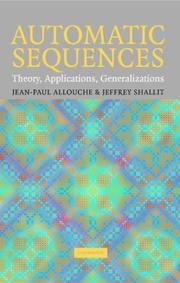
ISBN: 1316085899 1280436530 9786610436538 0511205465 0511169515 0511062087 0511546564 0511308361 0511070543 9780511062087 9780511546563 9780521823326 0521823323 9781280436536 9780511547003 0511547005 0521823323 9780521892421 9780511055751 0511055757 Year: 2003 Publisher: Cambridge ; New York : Cambridge University Press,
Abstract | Keywords | Export | Availability | Bookmark
 Loading...
Loading...Choose an application
- Reference Manager
- EndNote
- RefWorks (Direct export to RefWorks)
Uniting dozens of seemingly disparate results from different fields, this book combines concepts from mathematics and computer science to present the first integrated treatment of sequences generated by 'finite automata'. The authors apply the theory to the study of automatic sequences and their generalizations, such as Sturmian words and k-regular sequences. And further, they provide applications to number theory (particularly to formal power series and transcendence in finite characteristic), physics, computer graphics, and music. Starting from first principles wherever feasible, basic results from combinatorics on words, numeration systems, and models of computation are discussed. Thus this book is suitable for graduate students or advanced undergraduates, as well as for mature researchers wishing to know more about this fascinating subject. Results are presented from first principles wherever feasible, and the book is supplemented by a collection of 460 exercises, 85 open problems, and over 1600 citations to the literature.
Automation. --- Mathematics. --- Sequences (Mathematics). --- Sequential machine theory. --- Mathematics --- Physical Sciences & Mathematics --- Algebra --- Sequences (Mathematics) --- Mathematical sequences --- Numerical sequences --- Finite automata --- Finite state machines (Machine theory) --- Machine theory --- Electronic digital computers
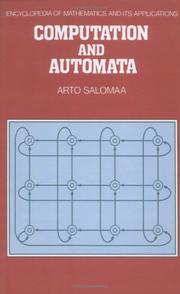
ISBN: 131608681X 1107090695 1107087589 1107099854 1107093821 1107325633 9781107087583 9781107325630 0521302455 9780521302456 9780521177337 Year: 1985 Volume: v. 25 Publisher: Cambridge [Cambridgeshire] ; New York : Cambridge University Press,
Abstract | Keywords | Export | Availability | Bookmark
 Loading...
Loading...Choose an application
- Reference Manager
- EndNote
- RefWorks (Direct export to RefWorks)
In this book, which was originally published in 1985, Arto Salomaa gives an introduction to certain mathematical topics central to theoretical computer science: computability and recursive functions, formal languages and automata, computational complexity and cryptography. Without sacrificing readability, the presentation is essentially self-contained, with detailed proofs of all statements provided. Professor Salomaa is well known for his books in this area. The present work provides an insight into the basics, together with explanations of some of the more important developments in the field.
Computable functions. --- Computational complexity. --- Sequential machine theory. --- Finite automata --- Finite state machines (Machine theory) --- Machine theory --- Electronic digital computers --- Complexity, Computational --- Electronic data processing --- Computability theory --- Functions, Computable --- Partial recursive functions --- Recursive functions, Partial --- Constructive mathematics --- Decidability (Mathematical logic)
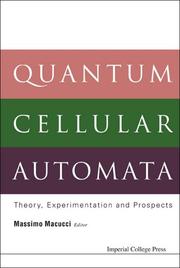
ISBN: 1281867209 9786611867201 1860949061 9781860949067 9781860946325 9781860949067 1860946321 9781281867209 6611867201 Year: 2006 Publisher: London : Imperial College Press,
Abstract | Keywords | Export | Availability | Bookmark
 Loading...
Loading...Choose an application
- Reference Manager
- EndNote
- RefWorks (Direct export to RefWorks)
"The Quantum Cellular Automaton (QCA) concept represents an attempt to break away from the traditional three-terminal device paradigm that has dominated digital computation. Since its early formulation in 1993 at Notre Dame University, the QCA idea has received significant attention and several physical implementations have been proposed. This book provides a comprehensive discussion of the simulation approaches and the experimental work that have been undertaken on the fabrication of devices capable of demonstrating the fundamentals of QCA action. Complementary views of future perspectives for QCA technology are presented, highlighting a process of realistic simulation and of targeted experiments that can be assumed as a model for the evaluation of future device proposals."
Cellular automata. --- Sequential machine theory. --- Finite automata --- Finite state machines (Machine theory) --- Machine theory --- Electronic digital computers --- Computers, Iterative circuit --- Iterative circuit computers --- Structures, Tessellation (Automata) --- Tessellation structures (Automata) --- Parallel processing (Electronic computers) --- Pattern recognition systems --- Sequential machine theory
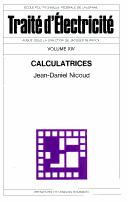
ISBN: 260400013X 2604000024 9782604000136 Year: 1970 Volume: 6 Publisher: St. Saphorin: Georgi,
Abstract | Keywords | Export | Availability | Bookmark
 Loading...
Loading...Choose an application
- Reference Manager
- EndNote
- RefWorks (Direct export to RefWorks)
621.313 --- 621.377 --- 621.377 Delay devices. Electric information storage devices (stores) --- Delay devices. Electric information storage devices (stores) --- 621.313 Electric machines --- Electric machines --- Sequential machine theory --- Machines séquentielles, théorie des --- elektrotechniek --- elektrische machines --- Electrical engineering --- Machines séquentielles, Théorie des. --- SEQUENTIAL MACHINES --- FINITE AUTOMATA --- SEQUENTIAL CIRCUITS --- ELECTRICAL ENGINEERING --- BINARY MACHINES --- Monograph --- Sequential machine theory. --- Sequential circuits. --- Electrical engineering. --- Electric engineering --- Engineering --- Circuits, Sequential --- Sequential logic circuits --- Logic circuits --- Finite automata --- Finite state machines (Machine theory) --- Machine theory --- Electronic digital computers --- Machines séquentielles, Théorie des.
| Listing 1 - 10 of 41 | << page >> |
Sort by
|

 Search
Search Feedback
Feedback About UniCat
About UniCat  Help
Help News
News